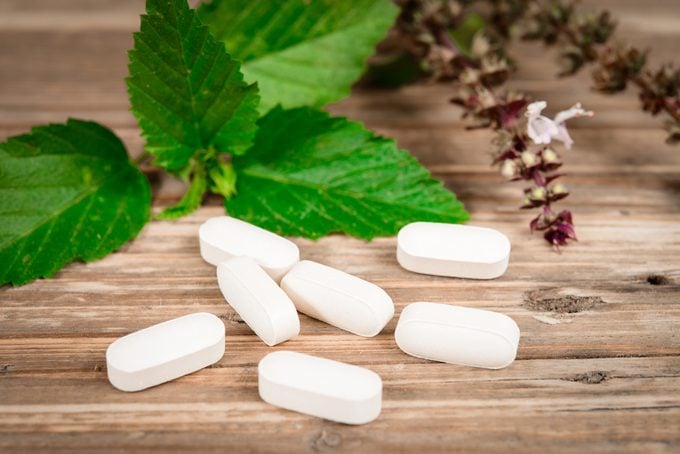Is It Safe to Mix Over-the-Counter Drugs with Supplements?
Over-the-counter drugs and supplements can complement each other, or go a bad way. Here are some tips on how to avoid a dangerous mix

Source: Vitamins, Minerals and Supplements (Reader’s Digest)
Want to mix herbs and supplements with over-the-counter drugs? It may not be as safe as you think’find out more about the risks involved.
Many people believe that herbs and other natural supplements are so gentle that they’re safe to use under any circumstances. Actually, a number of them interact in unwanted ways with prescription and over-the-counter drugs, intensifying or blunting the action of the medications or even producing dangerous side effects.
Although research in the area of herb’drug interactions has increased, there is still much to be learned about the potential for problems. Some herbs are known from human studies to interact with some drugs; evidence for other potential interactions comes from animal or laboratory work; and some possibly dangerous interactions are based only on theoretical understandings of how the compounds work, and are yet to be formally investigated.
How to stay safe when mixing conventional and alternative treatments
If you regularly take a prescription or over-the-counter medication, or even another dietary supplement, consult your doctor before taking a herbal remedy just to be safe. After all, part of the reason that herbs can be so helpful is that they contain active (which can mean potentially interactive) ingredients.
In the same vein, if you have a medical or psychiatric condition or are getting prepared for elective surgery, make sure you consult your doctor or pharmacist before trying any complementary medicine. For example, your surgeon may advise ceasing some supplements before the operation to reduce the risk of bleeding’particularly, chondroitin, fish oils, garlic, ginseng (both kinds), guarana, myrrh products, horse chestnut seed extract, licorice, red clover, saw palmetto, shark cartilage and vitamin E. Also, it is very important to list all your medications and supplements for your anaesthetist before any operation.
What else can supplements interact with?
Some supplements can interact with alcohol’including echinacea, lavender, melatonin, valerian, white willow bark or niacin (vitamin B3)’or with caffeine (guarana or melatonin). Some supplements can interfere with the absorption of all other drugs and should be taken at a different time of day; examples include flaxseeds, psyllium and slippery elm.
What about mixing different herbs and supplements?
When taken together, herbs and other supplements with similar actions or side effects may have a stronger effect in combination than either drug alone would have; sometimes, this is used by therapists to bring a condition or symptoms under control, but sometimes it can cause unwanted effects. For example, gotu kola and valerian can both have sedative effects. If you are unsure if the natural supplements you are thinking of taking together are safe, ask your pharmacist or alternative healthcare provider.




